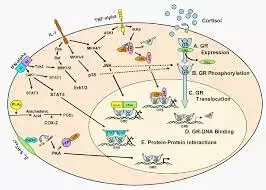- Home
- Medical news & Guidelines
- Anesthesiology
- Cardiology and CTVS
- Critical Care
- Dentistry
- Dermatology
- Diabetes and Endocrinology
- ENT
- Gastroenterology
- Medicine
- Nephrology
- Neurology
- Obstretics-Gynaecology
- Oncology
- Ophthalmology
- Orthopaedics
- Pediatrics-Neonatology
- Psychiatry
- Pulmonology
- Radiology
- Surgery
- Urology
- Laboratory Medicine
- Diet
- Nursing
- Paramedical
- Physiotherapy
- Health news
- Fact Check
- Bone Health Fact Check
- Brain Health Fact Check
- Cancer Related Fact Check
- Child Care Fact Check
- Dental and oral health fact check
- Diabetes and metabolic health fact check
- Diet and Nutrition Fact Check
- Eye and ENT Care Fact Check
- Fitness fact check
- Gut health fact check
- Heart health fact check
- Kidney health fact check
- Medical education fact check
- Men's health fact check
- Respiratory fact check
- Skin and hair care fact check
- Vaccine and Immunization fact check
- Women's health fact check
- AYUSH
- State News
- Andaman and Nicobar Islands
- Andhra Pradesh
- Arunachal Pradesh
- Assam
- Bihar
- Chandigarh
- Chattisgarh
- Dadra and Nagar Haveli
- Daman and Diu
- Delhi
- Goa
- Gujarat
- Haryana
- Himachal Pradesh
- Jammu & Kashmir
- Jharkhand
- Karnataka
- Kerala
- Ladakh
- Lakshadweep
- Madhya Pradesh
- Maharashtra
- Manipur
- Meghalaya
- Mizoram
- Nagaland
- Odisha
- Puducherry
- Punjab
- Rajasthan
- Sikkim
- Tamil Nadu
- Telangana
- Tripura
- Uttar Pradesh
- Uttrakhand
- West Bengal
- Medical Education
- Industry
Glucocorticoid effective option for preventing delirium after major surgeries

Glucocorticoid effective option for preventing Postoperative delirium among patients undergoing major non-cardiac surgery suggests a new study published in the BMC Anesthesiology.
The effects of intravenous glucocorticoids on postoperative delirium (POD) in adult patients undergoing major surgery remain controversial. Therefore, we conducted this meta-analysis to assess whether intravenous glucocorticoids can decrease POD incidence in the entire adult population undergoing major surgery and its association with patients age, type of surgery, and type of glucocorticoid.
They searched the relevant literature published before November 3, 2023, through Cochrane Library, PubMed, Embase, and Web of Science. The primary outcome was POD incidence. The risk ratio for the primary outcome was calculated using the Mantel–Haenszel method. The secondary outcomes included 30-day mortality, length of hospital stay, ICU duration, mechanical ventilation duration, and occurrence of glucocorticoid-related adverse effects (e.g., infection and hyperglycemia). This meta-analysis was registered in PROSPERO: CRD42022345997.
Results
They included eight randomized controlled studies involving 8972 patients. For the entire adult population undergoing major surgery, intravenous glucocorticoids reduced the POD incidence (risk ratio = 0.704, 95% confidence interval, 0.519–0.955; P = 0.024). However, subgroups defined by type of surgery showed differential effects of glucocorticoids on POD. Intravenous glucocorticoids can not reduce POD incidence in adult patients undergoing cardiac surgery (risk ratio = 0.961, 95% confidence interval, 0.769–1.202; P = 0.728), with firm evidence from trial sequential analysis. However, in major non-cardiac surgery, perioperative intravenous glucocorticoid reduced the incidence of POD (risk ratio = 0.491, 95% confidence interval, 0.338–0.714; P < 0.001), which warrants further studies due to inconclusive evidence by trial sequence analysis. In addition, the use of glucocorticoids may reduce the mechanical ventilation time (weighted mean difference, -1.350; 95% confidence interval, -1.846 to -0.854; P < 0.001) and ICU duration (weighted mean difference = -7.866; 95% confidence interval, -15.620 to -0.112; P = 0.047).
For the entire adult population undergoing major surgery, glucocorticoids reduced the POD incidence. However, the effects of glucocorticoids on POD appear to vary according to the type of surgery. In patients receiving major non-cardiac surgery, glucocorticoid may be an attractive drug in the prevention of POD, and further studies are needed to draw a definitive conclusion. In cardiac surgery, intravenous glucocorticoids have no such effect.
Reference:
Li, C., Zhang, Z., Xu, L. et al. Effects of intravenous glucocorticoids on postoperative delirium in adult patients undergoing major surgery: a systematic review and meta-analysis with trial sequential analysis. BMC Anesthesiol 23, 399 (2023). https://doi.org/10.1186/s12871-023-02359-8
Keywords:
Glucocorticoid, effective, option, preventing, Postoperative, delirium, among, patients, undergoing, major, non-cardiac surgery, BMC Anesthesiology, Li, C., Zhang, Z., Xu, L
Dr. Shravani Dali has completed her BDS from Pravara institute of medical sciences, loni. Following which she extensively worked in the healthcare sector for 2+ years. She has been actively involved in writing blogs in field of health and wellness. Currently she is pursuing her Masters of public health-health administration from Tata institute of social sciences. She can be contacted at editorial@medicaldialogues.in.
Dr Kamal Kant Kohli-MBBS, DTCD- a chest specialist with more than 30 years of practice and a flair for writing clinical articles, Dr Kamal Kant Kohli joined Medical Dialogues as a Chief Editor of Medical News. Besides writing articles, as an editor, he proofreads and verifies all the medical content published on Medical Dialogues including those coming from journals, studies,medical conferences,guidelines etc. Email: drkohli@medicaldialogues.in. Contact no. 011-43720751


